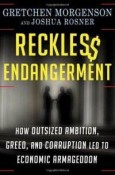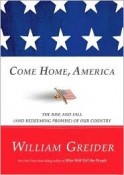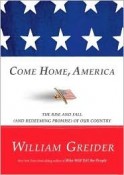Q&A: GRETCHEN MORGENSON – 2002 Pulitzer Prize winner
Written on July 3rd, 2011 |
Aired 06/26/11
GRETCHEN MORGENSON was awarded the Pulitzer Prize in 2002 for her "trenchant and incisive" coverage of Wall Street. She has been on that beat ever since and now has a book on the recent meltdown. Though we've had in depth conversations with Michael Lewis, Joseph Stiglitz, Simon Johnson, William Greider and others about the crisis, it's been a while since we covered it, and so this week we will have a chance to get an update on where things stand and look at some of the implications.
RECKLESS ENDANGERMENT lays out how the financial meltdown resulted from the toxic interplay of Washington, Wall Street, and corrupt mortgage lenders. It reveals how the watchdogs who were supposed to protect us from financial harm were actually complicit in creating the financial crisis, and focuses on the abuse of Fannie May and Freddie Mac.
http://www.nytimes.com/
Q&A: WILLIAM GREIDER – national affairs, The Nation magazine, author – Come Home America
Written on March 24th, 2010 |
Aired 03/21/10
I've been trying to book William Greider ever since I read an article of his last August about restructuring the Federal Reserve. For some, the Fed is the at the center of all that ails us. For others, it is the right place to house any new financial regulatory powers we might gain as a result of the current crisis.
There are now 32 co-sponsors for S604 in the Senate and 317 for HR1207 in the House for bills to audit the Federal Reserve, and 95,000 have signed a petition at http://www.auditthefed.com/
Just yesterday The U.S. Court of Appeals for the Second Circuit in New York ruled the Federal Reserve must disclose the names of banks that could have collapsed if they had not received emergency loans.
Greider wrote perhaps the finest book on the Federal Reserve and always seems to keep an eye on its secretive and too powerful ways. He challenged Greenspan and Paulson long before it was fashionable. And he was right.
We'll focus on the Fed and deal with other economic and political issues if we have time.
Q&A: JANE D’ARISTA, Author – REBUILDING THE FRAMEWORK FOR FINANCIAL REGULATION
Written on April 2nd, 2009 |
Aired 03/31/09
JANE D'ARISTA writes and lectures on economics and finance and is a Research Associate at the Political Economy Research Institute at the University of Massachusetts, Amherst. She served as a staff economist for the Banking and Commerce Committees of the U.S. House of Representatives, as a principal analyst in the international division of the Congressional Budget Office and has lectured in graduate programs at Boston University School of Law, the University of Massachusetts at Amherst, the University of Utah and the New School University. Her publications include a two-volume history of U.S. monetary policy and financial regulation.
Author, REBUILDING THE FRAMEWORK FOR FINANCIAL REGULATION
"...barely known among exalted policy-makers, ...progressive economists recognize the originality of her thinking..."
-- William Greider in "Fixing the Fed" (see below)
By William Greider, March 11, 2009, Nation
http://www.thenation.com/doc/20090330/greider/print?+nofollow
Congress and the Obama administration face an excruciating dilemma. To restore the crippled financial system, they are told, they must put up still more public money--hundreds of billions more--to rescue the largest banks and investment houses from failure. Even the dimmest politicians realize that this will further inflame the public's anger. People everywhere grasp that there is something morally wrong about bailing out the malefactors who caused this catastrophe. Yet we are told we have no choice. Unless taxpayers assume the losses for the largest financial institutions by buying their rotten assets, the banking industry will not resume normal lending and, therefore, the economy cannot recover.
Q&A: WILLIAM GREIDER, Correspondent & Author (Part 2 of 2)
Written on February 6th, 2009 |
Aired 02/05/09 Part 2 of 2
Now National Affairs Correspondent for the Nation, WILLIAM GREIDER has spent forty years examining how powerful institutions affect ordinary people. For 17 years he was the National Affairs Editor at Rolling Stone magazine, and is a former assistant managing editor at the Washington Post, where he worked for fifteen years as a national correspondent, editor and columnist. He is the author of national bestsellers ONE WORLD, READY OR NOT, SECRETS OF THE TEMPLE and WHO WILL TELL THE PEOPLE. Greider also served as a correspondent for six Frontline documentaries on PBS, including "Return to Beirut," which won an Emmy in 1985.
Q&A: WILLIAM GREIDER, Correspondent & Author (Part 1 of 2)
Written on February 6th, 2009 |
Aired 02/03/09 Part 1 of 2
I have been trying to book this week's guest every week since at least last September, and finally I got him. WILLIAM GREIDER has been right for so long about so many things that last fall I wanted his take on the emerging financial crisis and the prospects of Barack Obama's being elected. Once both of those things happened, I've wanted to talk with him about how we got here, what we need to do to deal with the crisis, and what a true progressive platform for turning things around would look like.
Now National Affairs Correspondent for the Nation, WILLIAM GREIDER has spent forty years examining how powerful institutions affect ordinary people. For 17 years he was the National Affairs Editor at Rolling Stone magazine, and is a former assistant managing editor at the Washington Post, where he worked for fifteen years as a national correspondent, editor and columnist. He is the author of national bestsellers ONE WORLD, READY OR NOT, SECRETS OF THE TEMPLE and WHO WILL TELL THE PEOPLE. Greider also served as a correspondent for six Frontline documentaries on PBS, including "Return to Beirut," which won an Emmy in 1985.
